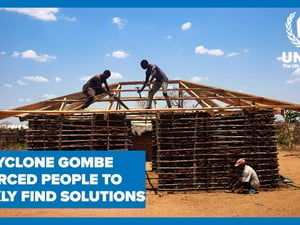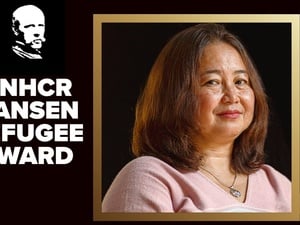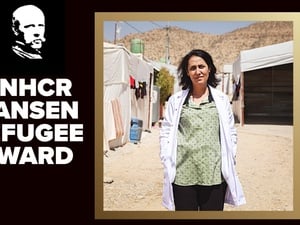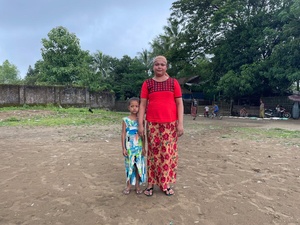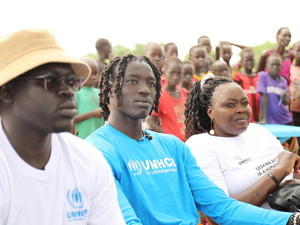Sri Lankan singer rises from displaced person to superstar
Sri Lankan singer rises from displaced person to superstar
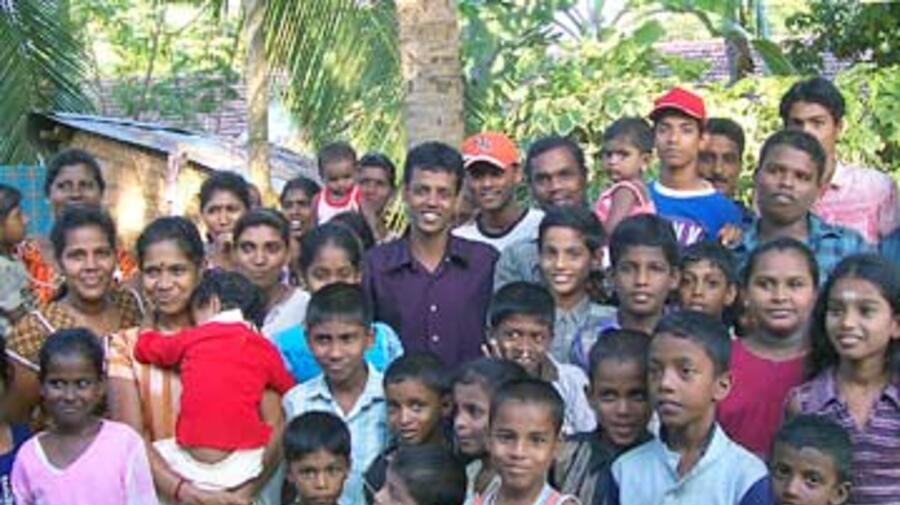
Singing sensation Sasiskaran (centre) surrounded by family and neighbours in Batticaloa.
BATTICALOA, Sri Lanka, August 27 (UNHCR) - The face of Sasiskaran, a newly popular singer from Trincomalee district in eastern Sri Lanka, shines with happiness. The most extraordinary thing about this raw talent is not that he beat 5,000 others to win a nationwide talent show, but that he was an internally displaced person (IDP) when he became a music idol.
Sasiskaran, 27, won the "Shakti TV Superstar" competition broadcast by a Tamil-language television station last month - without having any musical education. Holding his trophy, his face beams from posters all over the capital Colombo, but very few Sri Lankans know the real story of this young singer.
Sri Lanka has been mired in conflict for more than 25 years. Things have been especially hard for the population in the eastern and northern provinces since April last year, when fighting between the Sri Lankan army and the rebel Liberation Tigers of Tamil Eelam (LTTE) intensified.
Thousands of people were displaced, including Sasiskaran and his family, who had to leave their house in Batticaloa district, also in the east, in February due to clashes between the two sides. Sasiskaran had moved to Batticaloa after marrying a young woman from this district.
"We had to run away from our home due to the shelling, and seek refuge in a school close to Batticaloa town," Sasiskaran said. "Living in the school was very hard as the building was in bad condition, also there were no trees around and during the hot days we had no shadows to hide from the sun."
Singing was Sasiskaran's childhood dream. But it was not just a hobby for him and, aware of his talent, he participated in many singing contests searching for the opportunity to become popular. Thus, the singer was not surprised to be selected for "Shakti TV Superstar," having previously made it to the final rounds of other music competitions. What was surprising for him was that he made it at a time of war and displacement in the east.
Like the other participants, Sasiskaran chose some popular Indian songs in the Tamil language for the competition. "It was very difficult for me to find a proper place for singing practice in the school," he recalled.
"As the conflict was continuing in the first three rounds of the competition, I had to travel from the school to Colombo in order to participate in the programme. But after winning the third round, we left the school and were able to move to Colombo, from where I continued the competition."
In the first six rounds, participants were voted in through SMS texts from the public. "I was concerned because the people in the east, who I thought would most likely vote for me, did not have mobile signals at the time due to the war," he said. "I only became confident of my chances in the final stages, when a jury was asked to choose the best among the final participants."
The young singer is thankful for the public support he received: "Even with the conflict going on, people did not take into consideration my background or origin, only the way I performed. This makes me really happy and grateful to them."
A Sri Lankan young man who followed Sasiskaran's performance on TV said, "He has a good voice even if he does not have a basic knowledge of music." His colleague added, "During the competition the members of the jury told him that he has the right voice qualities to be a good singer in future."
Recently, Sasiskaran went home to Batticaloa, joining thousands of IDPs who returned when fighting in the east ended in May this year. He can now enjoy peace in his house in the company of family and neighbours.
"My dream turned into reality when I won the competition and I passed from being an IDP to a popular singer," he said. "My plan for the future is to produce my own music, but before that, I would like to do studies in music."
By Beatriz Gonzalez in Batticaloa, Sri Lanka


